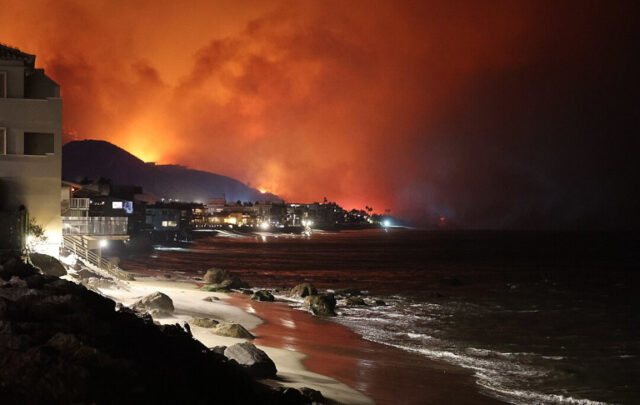 A Review of Degrowth by Giorgos Kallis (2018)
A Review of Degrowth by Giorgos Kallis (2018)
In Europe, “degrowth” is actually a movement, while in the US it is barely mentionable in polite society. To question “growth” would be the death knell for any serious politician. So what’s going on here? We live in the same world and face the same reality of “limits-to-growth” – a very popular concept in the US 50 years ago.
Well, since Earth Day, 1970, there has been a lot of “water under the bridge”, to be sure, but more to the point “oil in the pipeline”, especially in petro-states like the US. We may not be as dependent on oil as the other two big petro-states – the Saudis and the Russians – but it still skews our politics and our culture far more than most people realize. But Europe is not so well endowed with fossil fuels. That’s exactly the point of reading the European scholar Giorgos Kallis on degrowth. He’s not sidelined for painting a more sober view of the 21st century:
“Either we find a way to stop those who are plundering the earth and share the limited planet that we have, or we will enter a New Dark Age of humanity… There will never be enough until we share what there is… Degrowth marks a ruthless critique of the dogma of economic growth”.
Note the utopian element, which Kallis readily acknowledges: It’s not just about long-term economic contraction – that we must learn to live within our planetary means. That will happen one way or another anyway. He calls us to do all we can to avoid both catastrophe and plutocracy – the brutal dog-eat-dog and win-lose scenarios. Think of his solution as “resilience” plus “sharing”. And forget about the fiction of “green growth”.
The basic problem with neo-liberal capitalism, as Kallis understands it, is that “growth economies collapse without growth” and that already “the costs of growth exceed its benefits”. Furthermore, “Growth has always been based on exploitation” of human or natural resources, and “growth cannot reduce inequalities – it merely postpones confronting exploitation”.
Here is where Kallis becomes a bit cynical and doctrinaire, in that Piketty (“Capital in the 21st Century”) showed that there are rare periods in history, such as the 30 years following WW II, when general economic growth exceeds the return on capital, thus reducing inequality (channeling more benefits to the people, less to the capitalists). But Kallis is spot on for the last 40 years of neoliberal capitalism. Also, Piketty’s analysis suggests that reducing inequality during a long period of degrowth will be extremely difficult under any form of capitalism. That is, profits for some would come at the expense of lower living standards for the many, leading to escalating plutocracy.
So the real question for Kallis becomes, what could replace capitalism as we know it? After all, “under capitalism, market value encroaches and colonizes other social values” and fails to deliver increased happiness after growth exceeds a basic level of need. The Chicago School, and Thatcher, proudly proclaim “there is no alternative”, but history says otherwise: “even in the most oppressive of regimes, a ruling class may lose it legitimacy and collapse when one least expects it”.
To dig deeper into the alternatives, Kallis examines the concept of “value” itself. For example, do we want to “monetize” everything, as is the wont of most economists, somehow seeking the “correct” price for everything? These costs must somehow include the usually hidden costs of ecological damage and resource depletion, even the now “free” costs of household work, neighborly help, and volunteer work. Or should we seek to de-monetize more of our economy, via social norms and wise governmental regulation?
Kallis leans strongly towards de-monetizing, since governmental intervention is necessary in any case, as “free markets” themselves cannot impose the correct prices. Instead a core degrowth proposal is to “cap and share”; that is, to cap resource use or emissions (decreasing over time) and to share the capped goods equitably. He would also include moratoria on new extractive projects and phasing out of the old. “Use sufficiency, not efficiency”, would be the “organizing principle”. Here’s my own example: “economies of scale” that deplete critical resources or damage critical ecosystems would have to give way, requiring continuing scrutiny of large enterprises, suggesting at least partial public or stakeholder ownership to keep them on a tight leash.
Digging deeper into “growth” itself, Kallis shows that it’s more the kind of growth that matters to ordinary people. The first goal is to cover the necessities of life (productive work), the second is to apply the surplus (beyond the necessities) to meaningful, healthy, and enjoyable activities (unproductive, yet worthy). Who gets this surplus has usually been a matter of class and power and a perennial source of grievance. The huge challenge is how to resolve this inherent conflict by embedding egalitarian / sharing principles into the society.
In addition, under capitalism, a significant part of this surplus must be invested into “new means of production that create more surplus down the line”, while in a degrowth scenario some of the surplus would be invested into evolving technologies of sufficiency. Kallis cites nine planetary thresholds to be met by such technologies, as recently identified by a group of scientists. Now we’re not even close: “A study of 57 different materials found that for all of them, increases in consumption and production outpace savings from technological improvements and more efficient use”.
Kallis looks to history for both inspiration and caution: Consider neoclassical or laissez-faire economics where “labor, land, and money were treated as commodities” with disastrous results, so that “planning emerged as societies spontaneously responded to the disasters”. Are today’s escalating disasters of sufficient magnitude that a second transformation is just around the corner, or are we talking devastating collapse and war followed by a far smaller and more primitive society?
Already economic growth has become a “collective action tragedy”: If some nations continue to push growth while others practice degrowth, the latter will lose relative power, leaving the former to drive the system to collective collapse more rapidly. On a more positive note, Kallis elaborates on 9 economic principles, from local to global: (1) end to exploitation , (2) direct democracy, (3) more localized production, (4) sharing, (5) strong relationships, (6) economic surplus applied to collective meaning, (7) care, (8) diversity, (9) de-commodification of land, labor, and value.
To get at these 9 principles Kallis cites “four leverage points for intervention: work, fiscal and monetary reform, and environmental limits”. For example, “shift from taxing earnings to taxing resource use and environmental damage”, including a carbon tax with dividend (= universal basic income). A potential alternative to the latter is to provide “universal social services” (health care, housing, etc., extending the European model), or combine these two alternatives. But, in the absence of a well-defined agenda and powerful movement, the key will be a political strategy of resilience:
“A viable trajectory of change will probably involve political agency and strategy responding to the opportunities opened up by changing ecological economic conditions”. This is “coevolutionary change” in that “different spheres of activity interact with and change one another”.
As one example, Kallis cites how increasing automation and artificial intelligence will interact in complex ways with the increasing cost of energy intensive infrastructure and activities.
Yet, even as Kallis finds solid ground on his home turf, he remains pessimistic about globally coordinated degrowth: “There is no global arrangement capable of doing this, nor is there any foreseeable geopolitical movement in this direction”. However there is such a movement, called “democratic global governance” or “world government”, which has waxed and waned throughout the 20th century. An international group of us organized and promoted it at world social forums and the like from Samoa to Brazil to India to Europe 15 to 20 years ago. This could see a revival following the failure of the current resurgence of nationalism, as climate and other issues become ever more globalized.
Meanwhile Kallis’ stimulating book will give a boost to viable alternatives to neo-liberal capitalism, to place the Green New Deal on more solid ground, and to give us resiliency and courage for the political battles ahead.





